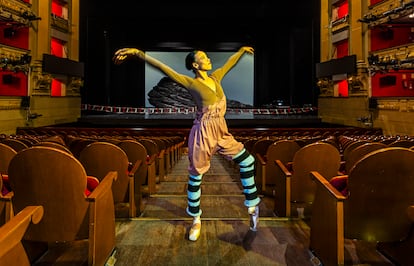Tonight, Nikisha Fogo (Stockholm, 29 years old) will finally teach her mother how to dance Swan Lake. “Do you know she’s never seen him?” says the dancer, with Jamaican roots, of her mother, a dance teacher in her fifties who has traveled from Sweden to Madrid just for today’s performance, Monday. “She’s been saving it her whole life, waiting for the day I made it. That’s what it means to have faith.” To play an important role in one of the most famous ballets of all time you have to be one of the company’s principal dancers. To be a principal dancer you don’t have to have white skin, it is assumed, but the black people who have become so still form a small group of bleeding exceptions. Fogo, rising star and principal dancer of the San Francisco Ballet, directed by the Spanish Tamara Rojo, which until tomorrow, Tuesday, represents an acclaimed Swan Lake at the Teatro Real, is one of the few to overcome that historic obstacle.
And he is not the only one. In 2022, Fogo fell into another old trope of the profession, that of the injured dancer: a foot injury kept her from the stage for months and there she also broke with tradition. Instead of hiding her fragility, she documented it on social media.
Ask. How had I not done Swan Lake before?
Answer. I must have done it twice. The first, with the Royal Swedish Ballet. But in 2020, the pandemic arrived.
P. And the next one?
R. The injury. In the foot, my most valuable asset. The flexor muscle of my big toe had become inflamed and I had, I was told, 10 centimeters of chronic fluid on the sole. I didn’t know what that was… A dancer always wants to give her all, she wants to perform no matter what happens, so I continued dancing with that foot no matter how many signs there were. His Achilles heel was completely blue.
P. What was the signal that made you stop?
R. I couldn’t walk.
P. Until then, did you think that dancing would make the pain go away?
R. Yeah…
P. Because?
R. It happens to many dancers. We want to continue, it is our passion. And that mentality can end up being toxic.
P. Where does that mentality come from?
R. When dancing, the last thing you want is for it to show how difficult it is. If when you see us the reaction is: “wowhow natural it comes out, how easy it seems”, we are doing it well. We don’t want to be seen as weak people, we want to seem like we can do it on our own. That also permeates the injuries.
P. The way he documented his surgery on social media is unusual, even revolutionary.
R. Yes, I would like to serve as an example, especially as a principal dancer, to remember that it is okay to take care of yourself. Ballet makes you very in tune with your body: always checking how you feel, looking in the mirror, trying to look perfect. That body awareness, let’s call it that, I now use to listen if something is not right. Much more seriously than before.
P. Have you been injured again since then?
R. I tore a tendon in a dress rehearsal. The me of the past would have said: “Well, I continue and everything will be fine until it stops going well.” But after the injury, I decided to step away so it wouldn’t get any worse.
P. If I quote the movie black swan, Is the conversation over?
R. It is the first question that is asked of any dancer as soon as they discover what they do. “Oh, is it like in Black swan?” Yes, in some aspects, yes: you work hard, everything is very intense. No, we don’t put broken glass in each other’s sneakers.
P. Did you always know that you were going to dedicate yourself to ballet?
R. I started doing hip hop, jazz, some television, dancing behind singers especially. I participated in Junior Eurovision (in 2010). And where dance was studied was the Royal Swedish Ballet school. Since I knew that ballet is the basis of all dance, I could study it and then dedicate myself to any style. But I fell in love with how structured ballet is, how accomplished you feel when you achieve any small achievement, because they are so, so difficult. The rest of the styles ask you to be yourself. Ballet is rigid, it is a structure.

P. Even knowing that it is not common to see black dancers in large companies?
R. I grew up without seeing someone like me on stage, someone to be inspired by. When I was little, my ballet teacher told me that my hair was too frizzy to be a professional dancer. Well, more fuel to the fire.
P. To the fire?
R. More desire to prove to them how wrong they are. At first I only played a certain type of role. Of course, no one saw me as a swan, or as someone graceful or shy or modest. They always gave me the most fiery roles. I don’t know if it was because of my skin color. I try not to think about it too much.

